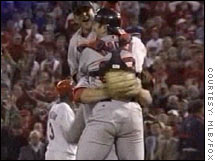
NEW YORK (CNN/Money) - The curse is dead. Long live the new curse.
As anyone with a pulse knows by now, the Boston Red Sox won their first World Series in 86 years Wednesday night. But the denizens of Red Sox Nation should not expect happy celebrations to become an annual ritual.
The cold truth is that a number of obstacles make it more difficult than ever for any team to repeat as baseball's champions.
First up is the fact that 17 players on Boston's roster are potential free agents. Some are bit players at best, but the list includes many everyday starters -- Orlando Cabrera, Kevin Millar, and Jason Varitek -- as well as starting pitchers Pedro Martinez and Derek Lowe.
Even with the second largest payroll in Major League Baseball, the team has limited resources with which to try to resign the players.
About $60 million is already committed for next season to six other key players -- Manny Ramirez, Curt Schilling, David Ortiz, Johnny Damon, Trot Nixon and Keith Foulke. The same six made about $55 million this year.
Teams that win championships often get a healthy bump in attendance and revenue the following season. Last year's champs, the Florida Marlins, saw about a one-third increase in ticket sales.
But the Red Sox have done such a good job maximizing revenue from Fenway Park, the smallest big-league stadium, that adding significantly new ticket revenue will be difficult. After all, they sold out every home game this year.
 |
|
| Curse or no curse, repeating this week's celebration will be tough for the Red Sox. |
Team officials hope to add a few thousand seats in the offseason, and a healthy ticket price increase is probably in the works. But the team will have trouble covering any increased payroll. Just keeping the team together will cost a lot more.
Two years ago, the champion Anaheim Angels kept their roster relatively unchanged after winning, saw the payroll increase more than 50 percent and their regular-season wins fall by more than 20 percent. They had to sign some major new stars -- and boost payroll by 27 percent -- to get back to the playoffs in 2004.
Last year, the Marlins held the line better on payroll, keeping many stars but letting team leader Ivan Rodriguez leave a free agent. They also fell short of playoff contention.
"The Red Sox will have the same problem once they win: everyone wants more money," said Gary Gillette, co-editor of the Baseball Encyclopedia and co-chairman of the business of baseball committee of SABR, a baseball research group. "Derek Lowe probably saw his value go up 40 percent in the couple of weeks."
Tough decisions
Principal owner John Henry has vowed to have a competitive team next season, but he'll have to make some tough, and probably unpopular, decisions.
| SportsBiz
|

|
| Click here for SI.com sports coverage
|
|
|
Sox management has made some tough choices in the past. They traded star shortstop Nomar Garciaparra, one of the most popular players in the franchise's history. And for a time, they were willing to give away World Series MVP Manny Ramirez for the asking.
Gillette says it's probably easier to make those kinds of hard choices when trying to capture a championship rather than after winning one. If the Sox start paying top dollar for replaceable stars like Millar or Lowe, it's a sign they're on the wrong path.
"I think the odds are good that the Red Sox will resist that kind of stuff," said Gillette. "I don't see any evidence in new ownership history that they will go hog wild on all the champagne they swilled last night and spend money in a foolish way."
But the Red Sox will have to compete against a team with the resources and willingness to overspend to lock up talent -- the New York Yankees, the only team with more money and a larger payroll than Boston.
Clearly the extra round of playoffs added in 1995 increased the chances that baseball's best, and richest, teams will make it to the postseason. It is no coincidence that the Red Sox have made the postseason five times in the first 10 years of the expanded playoffs, compared to only four times in the first 25 years of divisional play.
But the extra round of playoffs also makes it far more difficult for the strongest and deepest team to win the World Series. Luck or a single mistake can turn a series and eliminate a strong team.
The past five World Series have involved eight different teams, and produced five different champions. The past three champs have not even won their division.
So repeating next year will not be an easy task. Even now, the annual refrain of "Wait 'til next year" should hold no solace for Red Sox fans.

|

